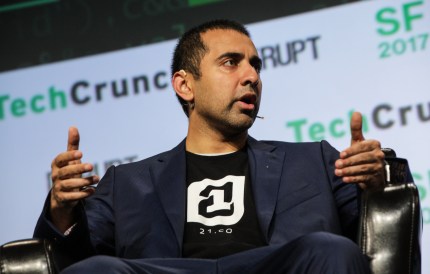“When an investor passes on you, they will not tell you the real reason,” said Tom Blomfield, group partner at Y Combinator. “At seed stage, frankly, no one knows what’s going to fucking happen. The future is so uncertain. All they’re judging is the perceived quality of the founder. When they pass, what they’re thinking in their head is that this person is not impressive enough. Not formidable. Not smart enough. Not hardworking enough. Whatever it is, ‘I am not convinced this person is a winner.’ And they will never say that to you, because you would get upset. And then you would never want to pitch them again.”
Blomfield should know — he was the founder of Monzo Bank, one of the brightest-shining stars in the U.K. startup sky. For the past three years or so, he’s been a partner at Y Combinator. He joined me onstage at TechCrunch Early Stage in Boston on Thursday, in a session titled “How to Raise Money and Come Out Alive.” There were no minced words or pulled punches: only real talk and the occasional F-bomb flowed.
Understand the power law of investor returns
At the heart of the venture capital model lies the power law of returns, a concept that every founder must grasp to navigate the fundraising landscape effectively. In summary: A small number of highly successful investments will generate the majority of a VC firm’s returns, offsetting the losses from the many investments that fail to take off.
For VCs, this means a relentless focus on identifying and backing those rare startups with the potential for 100x to 1,000x returns. As a founder, your challenge is to convince investors that your startup has the potential to be one of those outliers, even if the probability of achieving such massive success seems as low as 1%.
Demonstrating this outsized potential requires a compelling vision, a deep understanding of your market, and a clear path to rapid growth. Founders must paint a picture of a future where their startup has captured a significant portion of a large and growing market, with a business model that can scale efficiently and profitably.
“Every VC, when they’re looking at your company, is not asking, ‘Oh, this founder’s asked me to invest at $5 million. Will it get to $10 million or $20 million?’ For a VC, that’s as good as failure,” said Blomfield. “Batting singles is literally identical to zeros for them. It does not move the needle in any way. The only thing that moves the needle for VC returns is home runs, is the 100x return, the 1,000x return.”
VCs are looking for founders who can back up their claims with data, traction, and a deep understanding of their industry. This means clearly grasping your key metrics, such as customer acquisition costs, lifetime value, and growth rates, and articulating how these metrics will evolve as you scale.
The importance of addressable market
One proxy for power law, is the size of your addressable market: It’s crucial to have a clear understanding of your total addressable market (TAM) and to be able to articulate this to investors in a compelling way. Your TAM represents the total revenue opportunity available to your startup if you were to capture 100% of your target market. It’s a theoretical ceiling on your potential growth, and it’s a key metric that VCs use to evaluate the potential scale of your business.
When presenting your TAM to investors, be realistic and back up your estimates with data and research. VCs are highly skilled at evaluating market potential, and they’ll quickly see through any attempts to inflate or exaggerate your market size. Instead, focus on presenting a clear and compelling case for why your market is attractive, how you plan to capture a significant share of it, and what unique advantages your startup brings to the table.
Leverage is the name of the game
Raising venture capital is not just about pitching your startup to investors and hoping for the best. It’s a strategic process that involves creating leverage and competition among investors to secure the best possible terms for your company.
“YC is very, very good at [generating] leverage. We basically collect a bunch of the best companies in the world, we put them through a program, and at the end, we have a demo day where the world’s best investors basically run an auction process to try and invest in the companies,” Blomfield summarized. “And whether or not you’re doing an accelerator, trying to create that kind of pressured situation, that kind of high leverage situation where you have multiple investors bidding for your company, it’s really the only way you get great investment outcomes. YC just manufactures that for you. It’s very, very useful.”
Even if you’re not part of an accelerator program, there are still ways to create competition and leverage among investors. One strategy is to run a tight fundraising process, setting a clear timeline for when you’ll be making a decision and communicating this to investors upfront. This creates a sense of urgency and scarcity, as investors know they have a limited offer window.
Another tactic is to be strategic about the order in which you meet with investors. Start with investors who are likely to be more skeptical or have a longer decision-making process, and then move on to those who are more likely to move quickly. This allows you to build momentum and create a sense of inevitability around your fundraise.
Angels invest with their heart
Blomfield also discussed how angel investors often have different motivations and rubrics for investing than professional investors: They usually invest at a higher rate than VCs, particularly for early-stage deals. This is because angels typically invest their own money and are more likely to be swayed by a compelling founder or vision, even if the business is still in its early stages.
Another key advantage of working with angel investors is that they can often provide introductions to other investors and help you build momentum in your fundraising efforts. Many successful fundraising rounds start with a few key angel investors coming on board, which then helps attract the interest of larger VCs.
Blomfield shared the example of a round that came together slowly; over 180 meetings and 4.5 months’ worth of hard slog.
“This is actually the reality of most rounds that are done today: You read about the blockbuster round in TechCrunch. You know, ‘I raised $100 million from Sequoia kind of rounds.’ But honestly, TechCrunch doesn’t write so much about the ‘I ground it out for four and a half months and finally closed my round after meeting 190 investors,’” Blomfield said. “Actually, this is how most rounds get done. And a lot of it depends on angel investors.”
Investor feedback can be misleading
One of the most challenging aspects of the fundraising process for founders is navigating the feedback they receive from investors. While it’s natural to seek out and carefully consider any advice or criticism from potential backers, it’s crucial to recognize that investor feedback can often be misleading or counterproductive.
Blomfield explains that investors will often pass on a deal for reasons they don’t fully disclose to the founder. They may cite concerns about the market, the product, or the team, but these are often just superficial justifications for a more fundamental lack of conviction or fit with their investment thesis.
“The takeaway from this is when an investor gives you a bunch of feedback on your seed-stage pitch, some founders are like, ‘Oh my god, they said my go-to-market isn’t developed enough. Better go and do that.’ But it leads people astray, because the reasons are mostly bullshit,” says Blomfield. “You might end up pivoting your whole company strategy based on some random feedback that an investor gave you, when actually they’re thinking, ‘I don’t think the founders are good enough,’ which is a tough truth they’ll never tell you.”
Investors are not always right. Just because an investor has passed on your deal doesn’t necessarily mean that your startup is flawed or lacking in potential. Many of the most successful companies in history have been passed over by countless investors before finding the right fit.
Do your due diligence on investors
The investors you bring on board will provide the capital you need to grow and will serve as key partners and advisers as you navigate the challenges of scaling your business. Choosing the wrong investors can lead to misaligned incentives, conflicts, and even the failure of your company. A lot of that is avoidable by doing thorough due diligence on potential investors before signing any deals. This means looking beyond just the size of their fund or the names in their portfolio and really digging into their reputation, track record, and approach to working with founders.
“Eighty-odd percent of investors give you money. The money is the same. And you get back to running your business. And you have to figure it out. I think, unfortunately, there are about 15% to 20% of investors who are actively destructive,” Blomfield said. “They give you money, and then they try to help out, and they fuck shit up. They are super demanding, or push you to pivot the business in a crazy direction, or push you to spend the money they’ve just given you to hire faster.”
One key piece of advice from Blomfield is to speak with founders of companies that have not performed well within an investor’s portfolio. While it’s natural for investors to tout their successful investments, you can often learn more by examining how they behave when things aren’t going according to plan.
“The successful founders are going to say nice things. But the middling, the singles, and the strikeouts, the failures, go and talk to those people. And don’t get an introduction from the investor. Go and do your own research. Find those founders and ask, ‘How did these investors act when times got tough?’” Blomfield advised.































Comment